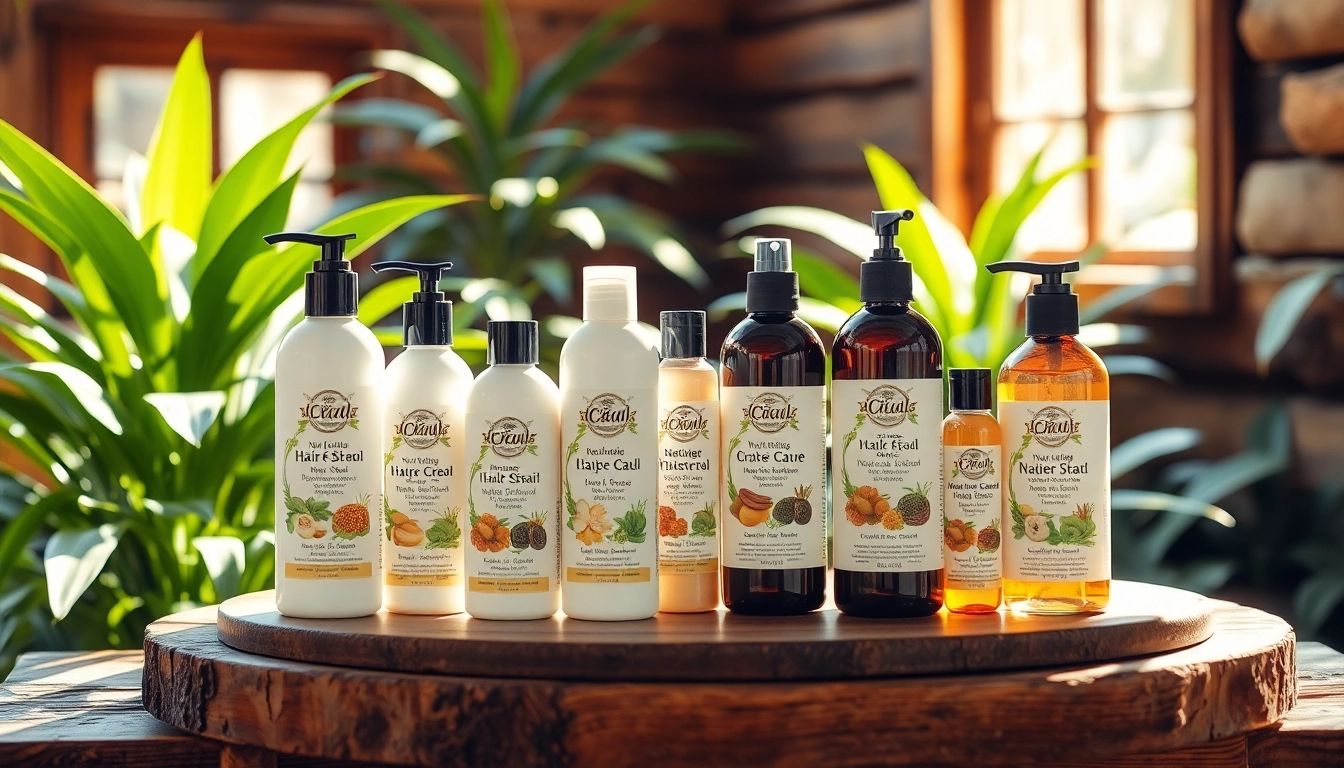Understanding Natural Hair Products
What Are Natural Hair Products?
Natural hair products are formulated primarily from ingredients derived from nature, without synthetic additives, artificial fragrances, or harsh chemicals. These products are designed to cleanse, nourish, and style hair while prioritizing the health of both the hair and the scalp. Many individuals gravitate toward using natural hair products because they appreciate the transparency of ingredients and the potential benefits for their hair and overall well-being.
Benefits of Using Natural Hair Products
- Healthier Hair and Scalp: Natural products often contain essential nutrients and oils that can promote healthier hair growth and a balanced scalp environment.
- Environmentally Friendly: Many natural hair products are produced using sustainable practices and biodegradable ingredients, reducing their impact on the environment.
- Hypoallergenic: The absence of synthetic fragrances and harsh chemicals minimizes the risk of allergic reactions, making these products suitable for sensitive skin.
- Customizable: Natural hair care allows for the combination of different ingredients tailored to specific hair needs, providing a personalized beauty approach.
- Brighter and Healthier Appearance: Natural ingredients such as oils, plant extracts, and herbal infusions can lead to shinier, softer, and more vibrant hair.
Common Ingredients in Natural Hair Products
When exploring natural hair products, one will encounter a variety of common ingredients known for their benefits:
- Aloe Vera: Known for its moisturizing properties, aloe vera helps soothe the scalp and moisturize strands, making it a prime ingredient in many conditioners and gels.
- Coconut Oil: Renowned for its deep conditioning abilities, coconut oil penetrates the hair shaft, reduces protein loss, and helps prevent breakage.
- Shea Butter: Rich in vitamins A and E, shea butter offers intense hydration and acts as a protective barrier for the hair.
- Jojoba Oil: Mimicking the natural oils of the scalp, jojoba oil can regulate sebum production and enhance hair shine.
- Essential Oils: Oils like lavender, peppermint, and rosemary can stimulate hair growth, enhance scalp health, and add a pleasant fragrance to products.
Choosing the Right Natural Hair Products for Your Hair Type
Identifying Your Hair Type
Understanding your hair type is crucial in selecting the right natural hair products. Hair can be categorized based on its texture (straight, wavy, curly, coily) and condition (normal, dry, oily, damaged). Different hair types have varying needs, and therefore, the products you choose should cater specifically to those needs. For example, curly hair may require heavier moisturizers, while fine hair benefits from lighter formulations that won’t weigh it down.
Top Natural Hair Products for Curly Hair
Curly hair often craves moisture and definition. Here are some recommended products:
- Moisturizing Creams: Look for products that include ingredients like shea butter and coconut oil to keep curls hydrated and defined.
- Leave-In Conditioners: These are excellent for adding ongoing moisture throughout the day and can significantly reduce frizz and enhance curl definition.
- Hair Gels and Curl Definers: Formulas containing aloe vera or flaxseed gel provide hold without crunch, allowing curls to remain defined and bouncy.
Best Natural Hair Products for Dry or Damaged Hair
For individuals experiencing dryness or damage, it’s essential to focus on restoring moisture and repairing the hair:
- Deep Conditioning Masks: Look for masks enriched with ingredients like argan oil and honey that can penetrate deeply to restore moisture and elasticity.
- Hydrating Oils: Easily absorbed oils such as jojoba oil or grapeseed oil can seal moisture in while providing nourishment to damaged strands.
- Gentle Shampoos: Opt for sulfate-free shampoos that cleanse the hair without stripping its natural oils, maintaining hydration and health.
Application Techniques for Natural Hair Products
How to Apply Natural Hair Oils
Applying natural hair oils can be an excellent way to moisturize and protect hair. Consider using these techniques:
- Dampen Your Hair: Apply oils to damp hair to lock in moisture more effectively.
- Use a Small Amount: Start with a few drops of oil, warming it in your palms before application to avoid greasiness.
- Section Your Hair: Work in sections to ensure even distribution; apply from the ends to the roots to avoid weighing down the hair.
- Massage into Scalp: Gently massaging oil into the scalp not only nourishes the roots but can also increase blood circulation.
Tips for Using Natural Hair Masks
Natural hair masks can deeply nourish and restore hair health. Here are helpful tips for application:
- Apply to Clean Hair: For maximum absorption, apply masks to freshly washed hair, enabling ingredients to penetrate smoothly.
- Use Heat: Cover your hair with a shower cap or warm towel. The heat opens up the hair cuticles, allowing products to penetrate deeply.
- Leave Time to Work: For best results, allow the mask to sit for at least 20-30 minutes; for deeply damaged hair, consider overnight applications.
- Rinse Thoroughly: Ensure to rinse the mask completely to avoid any residue that might weigh hair down.
Styling with Natural Hair Products
Styling can sometimes strip moisture from the hair, but using natural products can make a positive difference:
- Choose Lightweight Gels: Opt for natural gels made from flaxseeds or aloe vera to help style curls while maintaining moisture.
- Use Creams for Softness: Creams can define curls while adding softness and reducing frizz – apply sparingly to avoid heaviness.
- Avoid Over-Styling: Limit the use of heavy styling products to allow natural oils to nourish hair and maintain health.
Frequently Asked Questions About Natural Hair Products
Are Natural Hair Products Safe for All Hair Types?
Generally, natural hair products are safe for all hair types, but it’s essential to select products tailored to your specific hair needs. Individuals with fine hair may require lighter products, while those with coarse or curly hair may need significantly more hydration.
How Do I Transition to Using Natural Hair Products?
Transitioning to natural hair products requires patience:
- Research Products: Look for products that match your hair type and address any specific concerns you have.
- Phase Out Old Products: Gradually reduce the use of chemical-laden products as you introduce natural alternatives.
- Be Patient: It may take time for your hair to adjust; monitor how your hair responds and adjust accordingly.
Common Myths About Natural Hair Products
Several misconceptions surround natural hair products:
- Myth: They are always less effective than synthetic products. Reality: Many natural products can perform exceptionally well when formulated correctly, often outshining their synthetic counterparts.
- Myth: They are only for specific hair types. Reality: Well-formulated natural products can cater to a wide range of hair types.
- Myth: They lack hold or styling power. Reality: There are many natural styling gels and creams that provide excellent hold while maintaining hair health.
Where to Buy Quality Natural Hair Products
Top Retailers for Natural Hair Products
Several retailers specialize in quality natural hair products:
- Online Marketplaces: Platforms like NaturAll Club and MIELLE Organics offer an extensive selection of natural hair care options.
- Health Food Stores: Stores that focus on natural and organic products often have dedicated sections for hair care.
- Sally Beauty and Ulta: Both of these beauty retailers feature a variety of natural hair care brands catering to diverse hair needs.
Online Marketplaces to Consider
Multiple online marketplaces provide an array of natural hair products ranging in price and formulation:
- Amazon: Offers a variety of brands, user reviews, and price ranges.
- Indie Brands: Websites for indie brands often carry unique formulations not found in mainstream channels.
- Direct from the Manufacturer: Many brands sell directly through their websites, often providing exclusive offers.
Supporting Local Brands and Artisans
Buying from local brands and artisans supports the community and allows you to explore unique products that may not be mass-produced.
- Farmers Markets: Many local producers sell handmade hair care products at farmers markets, offering fresh and organic ingredients.
- Local Distributors: Research local small businesses that prioritize natural ingredients and ethical practices.
- Community Events: Attend local beauty fairs or community events showcasing natural hair care alternatives in your area.



